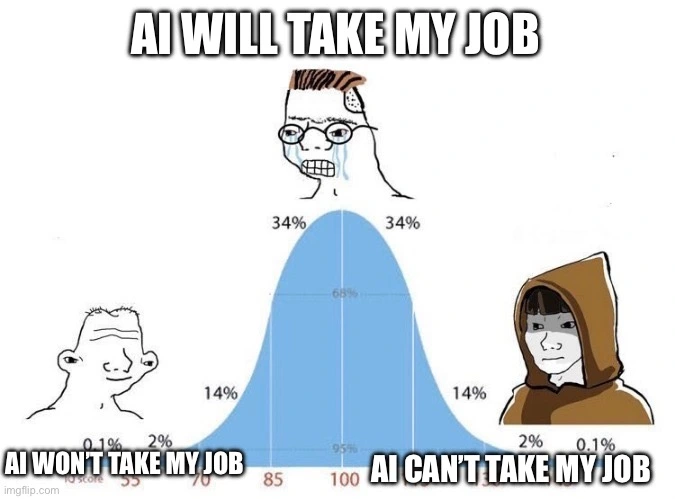this post was submitted on 25 Jun 2024
409 points (93.6% liked)
memes
10458 readers
2717 users here now
Community rules
1. Be civil
No trolling, bigotry or other insulting / annoying behaviour
2. No politics
This is non-politics community. For political memes please go to !politicalmemes@lemmy.world
3. No recent reposts
Check for reposts when posting a meme, you can only repost after 1 month
4. No bots
No bots without the express approval of the mods or the admins
5. No Spam/Ads
No advertisements or spam. This is an instance rule and the only way to live.
Sister communities
- !tenforward@lemmy.world : Star Trek memes, chat and shitposts
- !lemmyshitpost@lemmy.world : Lemmy Shitposts, anything and everything goes.
- !linuxmemes@lemmy.world : Linux themed memes
- !comicstrips@lemmy.world : for those who love comic stories.
founded 1 year ago
MODERATORS
you are viewing a single comment's thread
view the rest of the comments
view the rest of the comments

Have you coded with Claude Sonnet 3.5 yet? It is mind-blowingly better than Opus 3, which was already noticeably better than anything openAI has put out yet. Gpt 4 was nice to code with, but this is on a whole other level. I can't imagine what Opus 3.5 will be able to do.
The issue with sonnet 3.5 is, in my limited testing, is that even with explicit, specific, and direct prompting, it can't perform to anything near human ability, and will often make very stupid mistakes. I developed a program which essentially lets an AI program, rewrite, and test a game, but sonnet will consistently take lazy routes, use incorrect syntax, and repeatedly call the same function over and over again for no reason. If you can program the game yourself, it's a quick way to prototype, but unless you know how to properly format JSON and fix strange artefacts, it's just not there yet.
Which is why as an engineer I can either riddle with a prompt for half an hour... Or just write the damn method myself. For juniors it's an easy button, but for seniors who know how to write these algorithms it's usually just easier to write it up. Some nice starter code though, gets the boilerplate out of the way
Yeah. It's really interesting because juniors and hobbyist are the ones getting used to how to interact with it. Since it is rapidly improving, it won't be long until it will outpace the grunt work ability of seniors and the new seniors will be the ones willing and able to use it. Programming is switching away from being able to write tedious code and into being able to come up with ideas and convey them clearly to an llm. There's going to be a real leveling of the playing field when even the best seniors won't have any use for most of their grunt work coding skills. The jump up from Opus 3 to Sonnet 3.5 is absolutely insane, and Opus 3.5 should be here before too long.
That's really interesting. For android studio it's been absolutely crushing it for me. It's taken some getting used to, but I've had it build an app with about 60 files. I'm no master programmer, but I've been a hobbyist for a couple decades. What it's done in the last 5 days for me would have taken me 2 months easy, and there's lots of extra touches that I probably wouldn't have taken time to do if it wasn't as simple as loading in a few files and telling it what I want.
Usually when I work on something like this, my todo list grows much faster than my ability to actually put it together, but with this project I'm quickly running out of even any features that I can imagine. I've not had any of the issues of it running in circles like I would often get it gpt4.